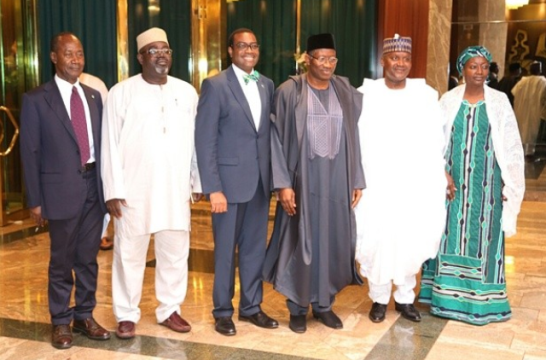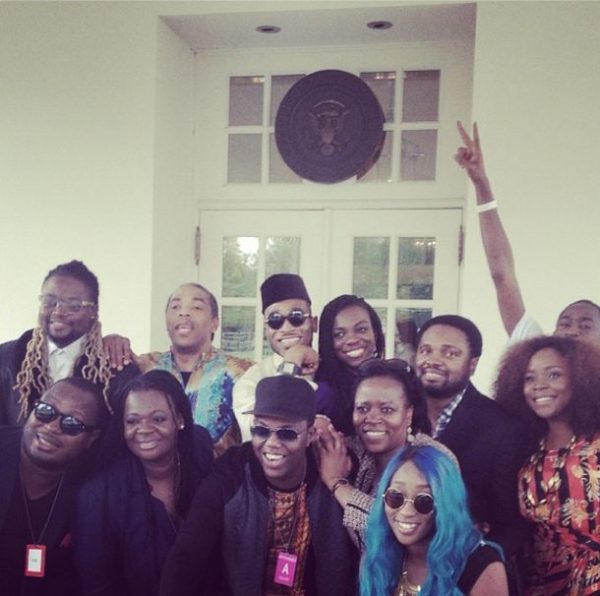TommyHilltrigga
Here comes THE BOOM!
Double
Last edited:
 W’Bank Drops Poverty in Nigeria to 33% from 61%
W’Bank Drops Poverty in Nigeria to 33% from 61%My grandfather owns property in Ghana and seeing as how the Black man is not welcome in the west it seems logical to go back home once I have the tools to help my people. Africa's biggest problem is the blatant corruption. It's fukking disrespectful, at least American politicians fear the consequences enough to lie about it. Nigeria is on the up and up but we as a people need to start demanding accountability from our politicians instead of staging another coup that replaces a liar with another liar.


















@Dreamestorical what is the young African leaders initiative?
It sounds like the U.S. is trying to in doctrine young Africans for their own gain.
Does anybody know U.S. true intent in this program?

 L-R Babatope Makun (COO Venture Garden Group),Kemi Shonubi (HR Venture Garden Group) & Funmi Ajagbe from First Bank
L-R Babatope Makun (COO Venture Garden Group),Kemi Shonubi (HR Venture Garden Group) & Funmi Ajagbe from First Bank Prof.Bamitale Omole (Vice Chancelor Obafemi Awolowo University)
Prof.Bamitale Omole (Vice Chancelor Obafemi Awolowo University)


@Dreamestorical what is the young African leaders initiative?
It sounds like the U.S. is trying to in doctrine young Africans for their own gain.
Does anybody know U.S. true intent in this program?













I really hope this for show, the last thing Africa needs is have western beliefs.some info .... funny that we have water issues in ohio and detroit
FLORIDA INTERNATIONAL UNIVERSITY
From Africa to FIU, young leaders find some inspiration
By Jeffrey Pierre
Under an Obama administration initiative, 25 young African leaders learned public administration and other skills at FIU.

Scholars discuss leadership goals in their roles back home in Africa as part of President Obama's Washington Fellowship for Young African Leaders training at Florida International University on Thursday, July 24, 2014. The visiting scholars receive leadership training that will help them in their work advocating for human rights, access to education and water sanitation, among other issues.
After six weeks at Florida International University, Danbala Garba leaves with much more than good memories. The Nigerian human rights advocate plans to return and redouble his efforts on behalf of those seeking justice.
“I intend to work harder and fight through the court, now more than ever,” said Garba, 32. “I’ve been triggered by what I’ve learned here.”
https://youngafricanleaders.state.gov/meet-the-fellows-danbala-garba/
Garba was among 25 young African leaders who spent six weeks at FIU as part of an Obama administration program to groom the next generation of leaders on the continent. The group left FIU on Saturday and plans to meet later in the day with Obama in Washington.

http://news.fiu.edu/2014/07/a-lawye...of-yali-washington-fellow-danbala-garba/79469
FIU was the only university selected in Florida to host the 25 young leaders between the ages of 25 and 35. They were selected from throughout sub-Saharan Africa for the Washington Fellowship for the Young African Leaders Initiative (YALI), which was created in 2010.
The administration selected 500 Africans and assigned them to universities throughout the United States. FIU received 25 based on those interested in public management.
The program focused on young people for a reason: Nearly one in three Africans are between the ages of 10 and 24, and about 60 percent of the continent’s population is below the age of 35, according to a State Department report.
Kwezi Kondile, a South African fellow, says engaging the youth is a problem he knows all too well. At 26, Kondile is an economic development consultant for McKinsey & Company in South Africa, but in his spare time, he works with an advocacy group called InkuluFreeHeid, a youth-led NGO, to foster social cohesion and democracy.
Specifically, he oversees a project called the National Youth Engagement where he and other youths work with senior leaders on national development policy.
In South Africa’s post-apartheid reconstruction state, Kondile says “with the youth right now, there’s a lot of apathy,” which he works to reverse.
The average age of a South African leader is 63, compared to 19 for the population, Kondile said.
“We have a young continent,” he said. “But what are we doing with these youths? How are we creating opportunities so we can ensure the continuity of our development?”
Each fellow — their backgrounds range from public health to agriculture — work or aspire to serve in all levels of government, the private sector and for non-governmental organizations.
Harriet Yayra Adzofu works as a psychiatric nurse with the Accra Psychiatric Hospital in Ghana and has hosted health talks to spread awareness of the stigma attached to those with mental disorders.
“When I tell people I work with those with mental disorders, they look at me with a third eye,” said Adzofu, 28. “People say you have to be crazy to work with crazy people.”
With the skills and networks she has built through the fellowship, Adzofu says YALI is a major resource for her future plans.
“I plan to start an NGO when I get back,” she said. “I already have some people on board.”
Many of the fellows say they applied for the program, still little-known in the U.S. and Africa, to improve their skills.
At a farewell reception on Thursday, the fellows heaped praise on Susan Webster, the director of training and international research initiatives at FIU, who quarterbacked efforts to bring them to the university.
In her 12 years with the university, Webster has been part of the Training and International Research Initiative, which helps minorities to excel in various fields.
“FIU is near and dear to my heart,” said Webster, a 1987 graduate of FIU. “This program says a lot about who we are as a university.”
Many fellows said the university’s “Worlds Ahead” slogan also speaks to why they were attracted to YALI.
Kondile says he takes pride in having grown up in Eastern Cape — just 40 miles from where Nelson Mandela was born — and in growing up in a family with deep political ties that taught him the importance of being socially active. His family even participated in the Truth and Reconciliation Commission, which was set up as part of the transition from apartheid to enable victims and perpetrators to come to terms with the country’s past.
Kondile attended Obama’s town hall in Johannesburg in 2013, where he talked about the initiative. Intense security prevented him from shaking the president’s hand, but he left eager to get involved because he wanted to give back to his country and the next generation.
“I consider myself an African first and a South African second,” he said. “If Africa doesn’t benefit, South Africa doesn’t benefit.”

Kwezi Kondile, age 26, from South Africa, far left, passes the yarn to a fellow scholar during a web building activity where the leaders pass the yarn to a peer they wish to recognize and appreciate for their contributions to the group as part of President Obama's Washington Fellowship for Young African Leaders training at Florida International University

Theresia Numbi, age 27, cq, from Tanzania, in center, speaks to her fellow leaders during a web building activity where the leaders pass the yarn to a peer they wish to recognize and appreciate for their contributions to the group.

Young African leaders participate in a web building activity where the leaders pass the yarn to a peer they wish to recognize and appreciate for their contributions to the group







Obama to Rename Africa Program for Nelson Mandela
WASHINGTON — Jul 27, 2014, 4:11 PM ET
By DARLENE SUPERVILLE Associated Press
Associated Press
A program designed to foster a new generation of young African leaders will be renamed after former South African President Nelson Mandela, the White House said Sunday.
President Barack Obama, who has said he was one of the untold millions of people around the world who were inspired by Mandela's life, is set to announce the name change at a town hall-style event on Monday in Washington with several hundred young leaders from across sub-Saharan Africa.
The youngsters are participating in the inaugural Washington Fellowship for Young African Leaders, part of the broader Young African Leaders Initiative that Obama launched in 2010 to support a new generation of leadership there. The fellowship is being renamed as a tribute to Mandela, who died last December at age 95.
Obama announced the fellowship during a stop in South Africa last summer. It connects young African leaders to leadership training opportunities at top U.S. universities.
In remarks at Monday's event, Obama also was announcing new public-private partnerships to create more programs for young African leaders, including four regional leadership centers across Africa, online classes and other resources, the White House said.
Mandela spent 27 years in jail under apartheid, South Africa's former system of white minority rule, before eventually leading his country through a difficult transition to democracy. In 1994, he became the first democratically elected leader of a post-apartheid South Africa.
This week's events with the next generation of young African leaders are a lead-in to the inaugural U.S.-Africa Leaders Summit, being held Aug. 4-6 in Washington. About 50 African leaders are expected to attend what the White House says will be the largest gathering any U.S. president has held with African heads of state and government.
———
Follow Darlene Superville on Twitter: http://www.twitter.com/dsupervilleap

